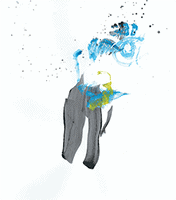How too much stress for too long can make you sick
By Sandra Dee Owens
Editor’s note: This is Part 2 of The Funologist’s story “The garage years.”Part 1 was printed in the July 7 issue of the Mountain Times. Look for Part 3 of this series in the first edition of September.
“And I felt logic and reason seep out through my skin like a gas, and suddenly, my ‘glass of stress’ poured over its rim like a burst dam, and the smallest, simplest tasks and decisions became unbearably difficult.” And for the next 2 1/2 years, fear and anxiety ruled my world.
1-800 crisis
Do you know the 1-800 crisis helpline you can call when life careens out of control?

‘Edge’ – acrylic/oil/ink
When I was 29, I called it. Never imagining I would need to, I scoffed as weak those who “needed” it. It was a young and foolish thought.
I am forever grateful to the health care professional on call that Sunday, who pulled me back from the edge I was falling over.
After a summer of homelessness and endless back pain due to a degenerating spinal condition (scoliosis), my husband and I moved our young family of four to a challenging living situation that sent my physical and mental health spiraling into dissaray.
Toppling
The first three years of living in the small, older garage without running water, on the land we bought, was an exciting “Little House on the Prairie”-like experience. We were thrilled to own land, even if it meant we would have to remove the remains of a burnt-down house by hand.
During the third year of living in the garage, our building plans shifted from a log cabin-style home to a traditional, joined timber frame using locally sawn white oak timbers (read: gorgeous, heavy, challenging, and very slow building style). My husband Bill’s building experience included a birdhouse.

‘Night crawler’ – acrylic/ink
Period.
As Year 4 began with no structure outside the garage window to give me hope, my coping skills began unraveling and I found myself in constant back pain and emotional distress.
I did not know what was wrong with me, I just knew something wasn’t right. In a round-the-clock state of unease, I turned to movement to try and settle my mind.
Always the sporty type, I took long night walks, crosscountry skied the fields across from our house, and even tried a women’s aquacise class but got pulled out of the class for pinning a lipsticked gal up against the pool wall in what was supposed to be a dignified game of gentle resistance.
Nothing worked. And as my ailments intensified, I lost the built-in gift of sleep.
And then it happened . . .
One day in spring, a large, new load of stress arrived. A load that on its own, I may have been able to navigate successfully. But piled on the teetering mountain of stress and anxiety I already had, it became the proverbial final straw.
I did not realize that longterm living without running water, caring for young children in a tiny space that doubled as a jewelry studio, a 20-mile weekly trip to the laundromat, barely making our mortgage doing weather- and travel-dependent craft shows, chronic back pain and unmet expectations of a house would topple my health.
But it did.
And as the new load of stress poured into me, I felt my glass of stress pour over its rim like a breached dam. My voice rose without my permission and I could not stop crying. Bill, sensing my desperate state, suggested taking our two daughters and visiting a beloved sister in Alabama. I grabbed the phone book and began calling airlines.
It was a great idea to get out of there for a little while, and I felt a smidgen of relief at the thought of it — relief that lasted until a receptionist told me the tickets would cost $1,000 each. It may as well have been a million dollars each.
And that’s when it happened.
I heard a crash. I felt the impact of slamming into a concrete wall at 1,000 mph.
And I lost contact with the earth and everyone on it. I felt myself drift up and outward, untethered—into dark silence.
And I knew I was in deep doo-doo. That’s when I called the number.
A man named Jamer was on call that day and asked me if I was suicidal. I answered an honest “no” and he celebrated that with me. Then he listened and afterward suggested I come in and offload some of that stress by talking with someone. His calm voice pulled me back from the edge … just for a few minutes. It lasted only as long as our conversation, but it was the greatest thing.
Bill said that my problems were his problems and accompanied me to the weekly counseling sessions. We went six times. In the first session, I learned that a nervous breakdown takes at least two years to recover from. I could not imagine surviving another month as it was. It was devastating news.
It took me closer to three years.
Deeply committed to recovering without the use of drugs, I slugged out the uncharted territory of a nervous breakdown day by day, trying hard to hold it together enough to care for our young daughters, make jewelry, and go to craft shows.
I functioned.
I loved, fed, bathed, and cared for our daughters as best I could. But at night, as they slept in their homemade bunk beds, and Bill slept on our pull-out couch/bed, I pulled on my Sorels, an oversized winter coat and hat, and crept outside to walk the streets.
Sleep had left me, so up and down our snowy, rural road, I dragged my boots, stopping under the streetlights to lean on my knees and vomit.
For more info about Sandra, visit: sandradeeowens.com.
Call 802-775-1000 to reach the Rutland Mental Health Crisis Helpline.



